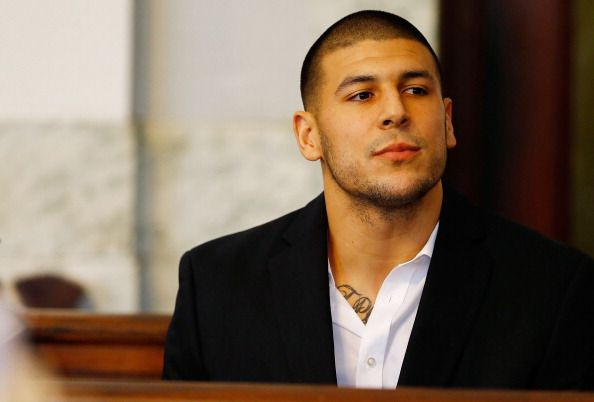Aaron Hernandez Dead From Apparent Suicide, An Act That Kills More Prisoners Than Drugs, Murder, And Accidents

Aaron Hernandez was found dead in an apparent suicide in his Massachusetts prison cell early Wednesday morning, CNN reported. The former New England Patriots tight end, who was serving a life sentence for a 2013 murder conviction, is reported to have used his bed sheet to hang himself from his cell window. Hernandez’s death shines a spotlight on the prevalence of depression and suicide in the American correctional system, both of which are of rising concern.
Hernandez was found dead hanging outside his cell window at Souza-Baranowski Correctional Center in Shirley at 3:05 a.m., CNN reported. Medical professionals attempted to revive him, but Hernandez was pronounced dead at UMass Leominster hospital an hour later. An autopsy is currently underway to determine exact cause of death.
Read: Suicide In America: Rate Reaches All-Time High, Especially Among Teen Girls
While Hernandez’s suicide made headlines due to his NFL fame prior to his conviction, suicide rates in American correctional facilities are already high. For example, suicide has been the leading cause of death in jails since 2000, and in 2013 accounted for more than one-third of all jail deaths in that year, Newsweek reported. Suicide rates in prisons are lower, with the most recent statistics in 2011 showing that suicide made up 5.5 percent of deaths in state and federal prisons, NBC News reported. Still, this is higher than deaths from drug and alcohol intoxication, homicide, and accidents combined.
Unfortunately, mental health issues are nothing new in the U.S. corrections system, and one study found that more than half of all prison and jail inmates in the U.S. had some kind of mental health condition, with mania and major depression accounting for the most. The signs of suicide can be difficult to spot, but according to the World Health Organization, all prisons should have a suicide prevention program consisting of properly trained correctional officers who can spot and intervene in cases where inmates show signs of contemplating such acts.
Although most prisons have special mental health workers, these individuals are often unable to prevent suicide, as these acts often occur during the evening or on weekends when such staff are off. As a result, it should be up to correctional officers to intervene during these critical times, NBC News reported.
Useful protocols corrections officers can follow to help prevent suicide include suicide screenings at intake, and creating “suicide resistant” cells for prisoners who are thought to be at imminent risk of killing themselves, Rutgers University reported.
See Also:
Teen Suicide Attempts Drop: Are Same-Sex Marriage Laws Responsible?



























